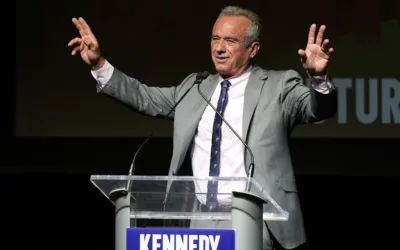
A new report outlines rural policy recommendations focused on four major tenets: protecting people’s freedom to live and work safely; investing in infrastructure; reining in corporate greed and protecting workers, small businesses, and family farmers; and creating opportunities for a better future. (Photo via Shutterstock)
In an appearance before the North American Agricultural Journalists last week, United States Department of Agriculture (USDA) Secretary Tom Vilsack said that “pretty radical” budget proposals from far-right Republicans on the House Agriculture Committee were halting progress on passing a now-overdue five-year farm bill.
The 2018 farm bill expired in September of 2023, but has been extended to cover the 2024 crop year while Congress struggles to pass a bipartisan replacement bill.
Here in Wisconsin, where over a quarter of the nation’s dairy farms are located, the delayed farm bill leaves farmers uncertain about the financial future of their work. Agriculture accounts for upwards of $100 billion of the state’s economy every year and more than 10% of the state’s jobs.
Vilsack emphasized the importance of finding a bipartisan solution if a new farm bill stands any chance of being passed—particularly because Republicans hold a slight majority in the House, while Democrats have a small advantage in the Senate. Farm bill negotiations between the parties have faced hurdles thanks to disagreements on issues like climate funding, SNAP benefits to help low-income families access fresh fruit and vegetables, and crop subsidies for the nation’s farmers.
“It just underscores the difficulty of getting to a farm bill,” he told reporters.
A “radical” Republican offshoot of the House Agriculture Committee bears significant blame for the struggle to find a solution, Vilsack said, pointing to the so-called Republican Study Committee (RSC). This group, driven by Trump-era policy ideas and composed of 21 of the House Agriculture Committee’s 29 Republican members, is pushing for major changes to farm and agriculture policies across the nation.
In fact, recent budget proposals from the RSC call for requiring farmers to pay larger portions of their crop insurance premiums, eliminating subsidies for American farmers earning over $500,000 annually, and cutting enrollment in both the Conservation Reserve Program and the Conservation Stewardship Program: the foremost USDA land stewardship programs, both of which enable farmers to operate their businesses with a heightened awareness of sustainability.
RSC proposals also state that no farm should receive over $40,000 in subsidies.
“It’s going to be interesting to see how it’s playing with members of the House,” Vilsack said of the proposals, titled the “Fiscal Sanity to Save America.”
Vilsack expressed concern about RSC proposals and urged the House Agriculture Committee to focus on the needs of farmers by steering away from radical subsidy cuts. Instead, he recommended invoking a financial reserve called the Commodity Credit Corp. (CCC), for which Vilsack serves as Chairperson.
According to the USDA, the CCC offers support to farmers through financial backing for conservation initiatives, “safety nets” for farmers when crop prices drop, protections for dairy farmers, livestock and disaster programs, and more.
Glenn “GT” Thompson (R-Pa.), Chairman of the House Agriculture Committee, is not a member of the RSC and has expressed the desire to hold markup meetings on a brand new farm bill—ideally a bipartisan one—before Congress leaves for its Memorial Day break.
Vilsack cautioned that continued pressure from the RSC could make that goal unattainable.
In the case of Republican pushback against a bipartisan farm bill with farmers’ best interests at its core, he pondered, “what are they telling the voters back home?”

This billionaire’s PAC is spreading a big lie about Tammy Baldwin, Medicare, and taxpayer savings
Restoration PAC, funded by Uline’s Richard Uihlein, twists the significance of forcing Big Pharma to negotiate for lower bulk pricing on Medicare...

New Biden rules deliver automatic cash refunds for canceled flights, ban surprise fees
In the aftermath of a canceled or delayed flight, there’s nothing less appealing than spending hours on the phone waiting to speak with an airline...

Opinion: It’s time for Congress to fight for small businesses instead of big corporations
May is National Small Business Month. Our elected leaders need to show leadership all year long. For the past 27 years I’ve been fortunate to pursue...

Biden makes 4 million more workers eligible for overtime pay
The Biden administration announced a new rule Tuesday to expand overtime pay for around 4 million lower-paid salaried employees nationwide. The...





